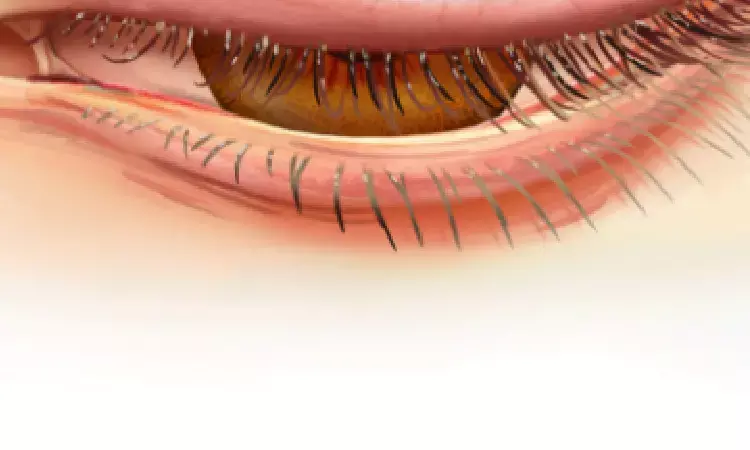- Home
- Medical news & Guidelines
- Anesthesiology
- Cardiology and CTVS
- Critical Care
- Dentistry
- Dermatology
- Diabetes and Endocrinology
- ENT
- Gastroenterology
- Medicine
- Nephrology
- Neurology
- Obstretics-Gynaecology
- Oncology
- Ophthalmology
- Orthopaedics
- Pediatrics-Neonatology
- Psychiatry
- Pulmonology
- Radiology
- Surgery
- Urology
- Laboratory Medicine
- Diet
- Nursing
- Paramedical
- Physiotherapy
- Health news
- Fact Check
- Bone Health Fact Check
- Brain Health Fact Check
- Cancer Related Fact Check
- Child Care Fact Check
- Dental and oral health fact check
- Diabetes and metabolic health fact check
- Diet and Nutrition Fact Check
- Eye and ENT Care Fact Check
- Fitness fact check
- Gut health fact check
- Heart health fact check
- Kidney health fact check
- Medical education fact check
- Men's health fact check
- Respiratory fact check
- Skin and hair care fact check
- Vaccine and Immunization fact check
- Women's health fact check
- AYUSH
- State News
- Andaman and Nicobar Islands
- Andhra Pradesh
- Arunachal Pradesh
- Assam
- Bihar
- Chandigarh
- Chattisgarh
- Dadra and Nagar Haveli
- Daman and Diu
- Delhi
- Goa
- Gujarat
- Haryana
- Himachal Pradesh
- Jammu & Kashmir
- Jharkhand
- Karnataka
- Kerala
- Ladakh
- Lakshadweep
- Madhya Pradesh
- Maharashtra
- Manipur
- Meghalaya
- Mizoram
- Nagaland
- Odisha
- Puducherry
- Punjab
- Rajasthan
- Sikkim
- Tamil Nadu
- Telangana
- Tripura
- Uttar Pradesh
- Uttrakhand
- West Bengal
- Medical Education
- Industry
Lotilaner ophthalmic solution may improve clinical signs of Demodex blepharitis for up to one year: Study

Lotilaner ophthalmic solution may improve clinical signs of Demodex blepharitis for up to one year suggests a study published in the Cornea.
This study aimed to evaluate the long-term outcomes of lotilaner ophthalmic solution, 0.25%, in the treatment of Demodex blepharitis. This observational, extension study included patients with Demodex blepharitis (N = 239) who completed the Saturn-1 study and presented for the day 180 visit. All participants were assessed at days 180 and 365 after the initiation of 6-week treatment with the study drug or its vehicle. Results: The proportion of patients with 0 to 2 collarettes (grade 0) was significantly higher in the study group (N = 128 patients) than in the control group (N = 111 patients) (39.8% vs. 2.7% at day 180 and 23.5% vs. 2.9% at day 365; P < 0.0001). Similarly, the proportion of patients with ≤10 collarettes (collarette grade 0–1) in the study group was significantly higher than in the control group (70.3% vs. 18.0% at day 180 and 62.6% vs. 21.9% at day 365; P < 0.0001). In the study group, erythema continued to improve even after completion of the 6-week lotilaner treatment. No serious ocular adverse events were observed in the study group, and there was 1 treatment-related ocular adverse event in the study group, which was considered mild.
After 6-week treatment with lotilaner ophthalmic solution, 0.25%, for Demodex blepharitis, no long-term concerns were observed during 1 year of follow-up. A high proportion of patients with 0 to 2 collarettes (grade 0) or ≤10 collarettes (collarette grade of 0 or 1) was observed throughout 1 year of follow-up, indicating that the efficacy of lotilaner ophthalmic solution, 0.25%, against Demodex blepharitis may last well after completion of therapy.
Reference:
Sadri, Ehsan MD*; Paauw, James D. MD†; Ciolino, Joseph B. MD‡; Nijm, Lisa MD, JD§; Simmons, Blake OD¶; Meyer, John MD║; Gaddie, Ian Benjamin OD**; Berdy, Gregg J. MD††; Holdbrook, Mark BA‡‡; Baba, Stephanie N. OD‡‡; Jalalat, Parisa OD*; Yeu, Elizabeth MD§§. Long-Term Outcomes of 6-Week Treatment of Lotilaner Ophthalmic Solution, 0.25%, for Demodex Blepharitis: A Noninterventional Extension Study. Cornea ():10.1097/ICO.0000000000003484, February 9, 2024. | DOI: 10.1097/ICO.0000000000003484.
Dr. Shravani Dali has completed her BDS from Pravara institute of medical sciences, loni. Following which she extensively worked in the healthcare sector for 2+ years. She has been actively involved in writing blogs in field of health and wellness. Currently she is pursuing her Masters of public health-health administration from Tata institute of social sciences. She can be contacted at editorial@medicaldialogues.in.
Dr Kamal Kant Kohli-MBBS, DTCD- a chest specialist with more than 30 years of practice and a flair for writing clinical articles, Dr Kamal Kant Kohli joined Medical Dialogues as a Chief Editor of Medical News. Besides writing articles, as an editor, he proofreads and verifies all the medical content published on Medical Dialogues including those coming from journals, studies,medical conferences,guidelines etc. Email: drkohli@medicaldialogues.in. Contact no. 011-43720751


